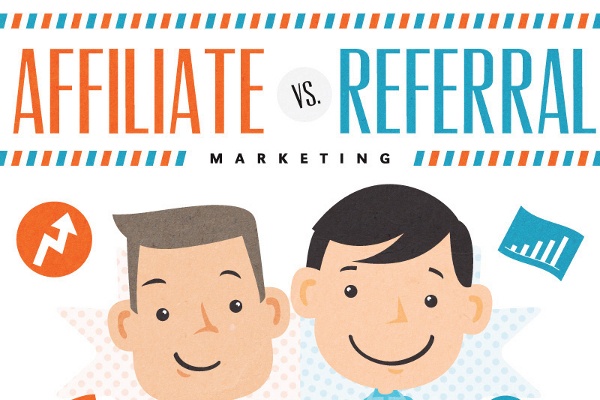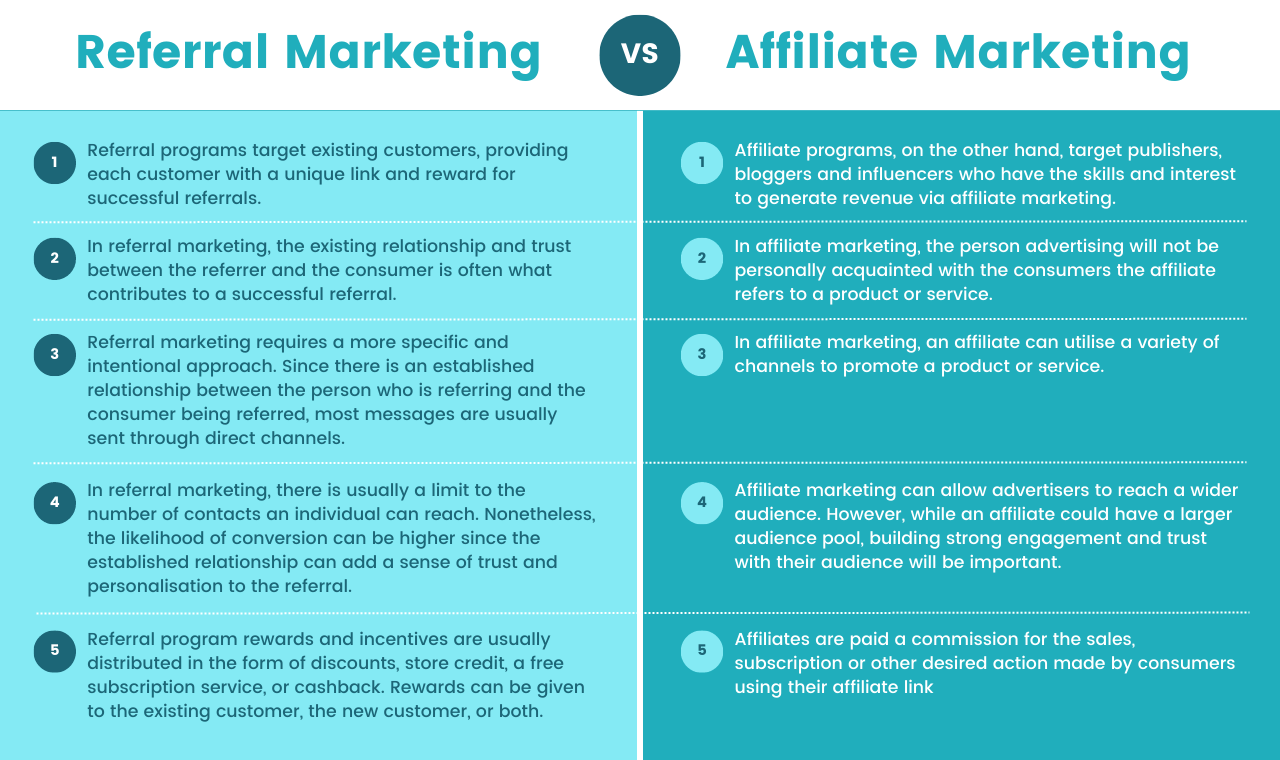Affiliate and referral marketing are two of the most popular revenue generation strategies for publishers. This article explains all you need to know about affiliate vs referral programs.

Affiliate marketing and referral marketing are often used interchangeably, which can cause confusion amongst marketers, influencers and advertisers on the differences between affiliate vs referral programs. Although both terms refer to marketing strategies that utilise the power of people to refer new customers to advertisers, affiliate marketing and referral marketing are not the same.
For advertisers planning to implement one or both and influencers unsure which avenue is right for them, it is important to understand the similarities and differences between the two. By leveraging these programs correctly, advertisers have the potential to increase brand awareness, attract new customers, and improve conversion rates, while affiliates can benefit as well.
What is Affiliate Marketing?
Affiliate marketing, also known as partnership marketing, is when an affiliate promotes other companies products. When someone purchases a product or service through an affiliate link, the affiliate gets a commission. This can either be a percentage of the total sale amount, a set amount per sale, or a set price per click depending on the advertiser’s business and criteria for conversion.
How Does an Affiliate Marketing Program Work?
Affiliate marketing programs are pay-per-conversion, with the affiliate shouldering the responsibility of driving sales for the advertiser.
An affiliate program’s success is contingent on locating advocates capable of reaching an advertiser’s target audience. Since customers will probably not know the advocate personally, many affiliates drive conversion through content marketing, such as by publishing reviews of products or services.
The affiliate marketing model operates by leveraging the abilities of both the advertiser and the affiliate for a more effective marketing strategy.
Advantages of Affiliate Programs
The main advantage of having an affiliate program is that it is entirely performance-based. As affiliates are only paid a commission once the desired action has taken place, it can be an effective strategy to drive the conversion advertisers are looking for.
Affiliate programs also offer the following benefits:
- Low overhead. Affiliate programs value performance over clicks, with advertisers only paying commissions when consumers take the desired action.
- Greater reach and targeted traffic. Advertisers receive access to a large pool of affiliates to work with, allowing them to be selective of who they partner with. By working with approved affiliates who understand their industry, advertisers can receive targeted sales and reach a wider audience. In 2020, 38% of marketers reported using affiliate marketing as a top acquisition channel.²
- Valuable partnership opportunities. Advertisers can work with bloggers and influencers to increase their sales and improve brand awareness.
- Detailed statistics and data. Advertisers can work with a trusted affiliate network like Commission Factory to gain access to a detailed dashboard and sales reports.
What is Referral Marketing?
Referral marketing, on the other hand, is when a business’s existing customers personally promote the advertiser to new users to earn rewards.
Successful referral campaigns motivate customers to share a brand with their family, friends, and peers in a straightforward, natural fashion. Unlike affiliate marketing, referral campaigns are based on personal interaction.
Advertisers using referral marketing reward or incentivise customers for recommending them via the referral campaign. As a result, referral marketing programs can also be a good way to promote an advertiser without significant overhead costs.
How Does a Referral Marketing Program Work?
Referral marketing works together with word of mouth. Satisfied customers are usually more open to sharing a product or service they enjoy engaging with, thereby increasing brand awareness and building trust. In fact, a 2020 study found that 92% of consumers trust referrals from people they know.¹ Furthermore, consumers referred by a friend are four times more likely to buy.¹
A referral program typically contains a referral link and/or unique code that customers can share. Then, when one of the customer’s friends or family members uses the referral, they can redeem their reward. Rewards may come in various forms such as discounts, free products, or sometimes cashback.
Advantages of Referral Programs
Compared to other forms of marketing and loyalty retention strategies, referral programs can offer advertisers a cost-effective way to gain new and loyal customers.
Some of the other benefits of referral marketing include:
- Improved customer retention rate. Referral marketing uses rewards to encourage customers to recommend products or services which can help foster customer loyalty. According to referral marketing statistics, referred customers have a 37% higher customer retention rate.¹
- Increased marketing reach. Referral marketing allows advertisers to increase their outreach by leveraging their own customers as advocates.
- Easy progress tracking. Advertisers can view engagement and assess referral success with regular progress tracking reports.
Affiliate Marketing vs. Referral Marketing: What are the Key Differences?
To further understand the differences between affiliate and referral programs, here are some key points to consider.
1. The Individual Referring New Customers
Referral programs target existing customers, providing each customer with a unique link and reward for successful referrals.
Affiliate programs, on the other hand, target publishers, bloggers and influencers who have the skills and interest to generate revenue via affiliate marketing. Once affiliates sign up for an affiliate program, the affiliate will be responsible for promoting their affiliate link on their own channels.
2. The Relationship with the Potential Customer
The biggest difference between an affiliate and referral program is the type of relationship between the person who is referring (the referrer or affiliate), and the person being referred to a advertiser’s products or services (the customer).
In affiliate marketing, the person advertising will not be personally acquainted with the consumers the affiliate refers to a product or service. However, many affiliates, especially influencers, may prefer to work with advertisers they connect with, as this provides them with a better ability to craft genuine and more personalised messages for their audiences.
In referral marketing, the existing relationship and trust between the referrer and the consumer is often what contributes to a successful referral. Since the referral model operates via recommendations from friends to friends, it can provide a higher sense of personalisation and trust.
3. Medium of Share
The strategies for sharing these two types of programs are slightly different. While affiliate programs rely on visitors landing on and clicking on an affiliate link, referral programs take a more direct approach.
In affiliate marketing, an affiliate can utilise a variety of channels to promote a product or service. However, affiliates should be mindful about the placement of their affiliate links, since choosing the right page and context will help encourage potential customers to trust and click on the affiliate link.
Referral marketing requires a more specific and intentional approach. Since there is an established relationship between the person who is referring and the consumer being referred, most messages are usually sent through direct channels. This personal communication usually results in a higher chance of the consumer making a purchase.
4. Audience Pool
In referral marketing, there is usually a limit to the number of contacts an individual can reach. Nonetheless, the likelihood of conversion can be higher since the established relationship can add a sense of trust and personalisation to the referral.
Affiliate marketing can allow advertisers to reach a wider audience. However, while an affiliate could have a larger audience pool, building strong engagement and trust with their audience will be important.
5. The Means of Compensation
Affiliates are paid a commission for the sales, subscription or other desired action made by consumers using their affiliate link.
Referral program rewards and incentives are usually distributed in the form of discounts, store credit, a free subscription service, or cashback. Rewards can be given to the existing customer, the new customer, or both.
What are the Similarities Between Affiliate and Referral Programs?
While affiliate and referral programs have many differences, they also share a few similarities. Below are several ways affiliate programs and referrals programs are alike:
1. Rewards-driven
Both affiliate and referral marketing programs offer incentives to encourage others to promote the advertiser.
2. Repeatable Marketing Channels
Both affiliate programs and referral programs are intended to drive growth, relying on other parties to bring in new leads and sales for the advertiser.
3. Budget-friendly
Given that commissions or rewards are only provided once the consumer takes the desired action, both affiliate and referral marketing programs have low overhead and offer marketers a strong return on investment.
Affiliate vs. Referral Marketing: Which is the Right Choice for an Online Business?
Choosing between referral marketing and affiliate marketing depends on a company’s business goals.
Advertisers looking to build their customer base slowly might want to consider starting with referral marketing and then moving towards affiliate marketing. On the other hand, advertisers looking to scale quickly can consider leveraging affiliate marketing or a combination of both affiliate and referral programs to work in their favour.
Before deciding, advertisers should consider the following:
- Product and business type
- Desired margin
- Time to scale
Final thoughts
Both affiliate and referral programs can leverage the influence of other voices to drive performance for advertisers.
While affiliate marketing relies on third-party brand advocates, referral marketing utilises the existing customer base to provide outreach and organically increase revenue. Ultimately, both programs use incentives to generate new customer revenue, but the difference between the two types comes down to how advertisers want to reach new audiences and nurture customer relationships.
Updated: 25th February 2021
Frequently Asked Questions
What Is the Difference Between Referral Marketing and Influencer Marketing?
Referral marketing is when a business’ existing customer promotes a product or service by referring it to other people. Influencer marketing on the other hand is when an influencer or an affiliate promotes a brand in return for commission. The influencer or affiliate in this case may or may not be a user of the product or service they are promoting.
Is Referral Marketing Paid?
Referral marketing usually involves a reward which can either take the form of a commission or access to some of the products or services the referrer promotes.
Is Referral Marketing Legal?
Yes, referral marketing is legal in most industries. However, certain industries such as real estate and finance may have regulations and licensing requirements when it comes to referral fees. It is best to check your local regulations if you are operating in any such industry.





